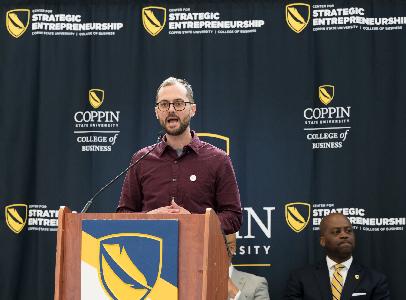Standing in front of a light bulb, Edmund Smith explained how a cyber attack could commandeer the switch.
With a “smart” light that isn’t properly secured, an attacker could capture data that’s coming from a set frequency, and later replay it back. That could allow them to assume control for on, off or dim controls, he said.
It’s just one example of a potential security threat that comes along with the Internet of Things, which connects devices to the internet. By digging into how the attack happens, Smith and other Morgan State University engineering students are looking to find ways to prevent the breaches from happening to the devices when they are deployed in the world.
The students have a new central point to carry out such work at the Center for Reverse Engineering and Assured Microelectronics (C.R.E.A.M). Housed in the historically black college’s Clarence M. Mitchell Jr. School of Engineering, the center was officially opened on Thursday night.
“It’s a signature program in the school,” said Michael Spencer, the dean of the engineering school.
The focus on IoT was a natural extension out of research for Kevin Kornegay, who is the director of the lab. The university already had a focus on embedded systems, which provide a foundation for IoT devices.
“I spent the better part of my career focusing on physical design of these systems,” he said. The focus of the lab, he said, is like “working backwards” through that process.
Morgan State wants research coming out of the lab to assist both the electronics industry as they produce devices, and the intelligence community as it provides security. The lab’s curriculum is built around three areas: communications, embedded systems design and security, Kornegay said. Thursday night’s guest list of representatives from the federal government and defense contractors indicated there is interest.
At the same time, the intent is to prepare students for jobs in the field. Maryland’s government institutions that potentially focus on these areas, such as the National Security Agency, Johns Hopkins Applied Physics Lab and other defense agencies, have a need for workers who are trained.
Agencies are already working with Morgan State University students through internships, Morgan State President David Wilson said Thursday, and officials hope the lab will help those relationships grow.
Join the conversation!
Find news, events, jobs and people who share your interests on Technical.ly's open community Slack

This Black gaming advocate has a mission to transform education through esports

'Be bold': This digital innovation and business strategist urges fellow women leaders to be their authentic selves

Baltimore Power Moves: Open Works and Coppin State partner for a new makerspace, degree and tech transfer program


